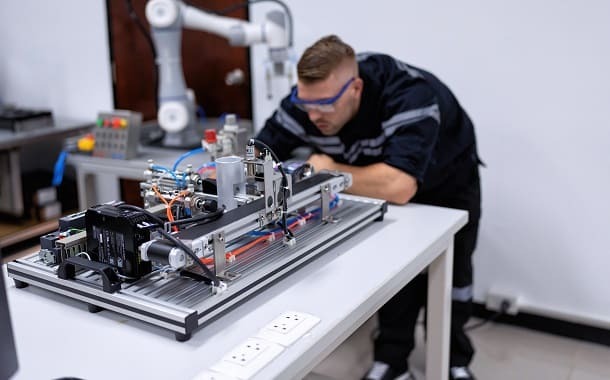
 Data Structure
Data Structure Networking
Networking RDBMS
RDBMS Operating System
Operating System Java
Java MS Excel
MS Excel iOS
iOS HTML
HTML CSS
CSS Android
Android Python
Python C Programming
C Programming C++
C++ C#
C# MongoDB
MongoDB MySQL
MySQL Javascript
Javascript PHP
PHP
- Selected Reading
- UPSC IAS Exams Notes
- Developer's Best Practices
- Questions and Answers
- Effective Resume Writing
- HR Interview Questions
- Computer Glossary
- Who is Who
What is the full form of IEEE?
Introduction
Institute of Electrical and Electronics Engineers (IEEE) started in the late 1800s mark. The American Institute of Electrical Engineers and the Institute of Radio Engineers, two earlier associations, were combined to make it in 1963.

Since then, the IEEE has extended into a tremendous worldwide association with over 400,000 individuals in more than 160 distinctive nations. The IEEE has played a noteworthy part in a number of critical specialised progressions, especially in regions like computers, telecommunications, and electrical frameworks for power. During the late 1800s and early 1900s, two of the associations that afterward became the IEEE were given to advancing electrical and electronic engineering.
To assist the consideration and application of electrical designing, the AIEE was established in 1884. To further the theory and application of radio engineering and related disciplines of electrical research, the IRE was founded in 1912. Over the following few decades, these two organisations expanded and changed, finally coming together in 1963 to become the IEEE that we are familiar with today.
The IEEE has had a tremendous expansion in terms of membership and range of operations since that merger and creation. It has grown to be the biggest technical professional association in the world and made significant contributions to the creation of several cutting-edge technologies.
Membership and Benefits of IEEE
For persons working in electrical and electronics engineering, computer science, and related subjects, membership in IEEE offers a variety of advantages. The following are some benefits of joining IEEE:
The organisation's extensive collection of research papers, conference proceedings, and technical publications gives you access to the most recent findings. Online tutorials and courses are also available at the library. You may stay current on new advancements and discoveries in your profession by using the library.
IEEE provides its members with a variety of networking options, such as local and regional gatherings, conferences, and online communities. You may connect with and cooperate with other professionals who have similar interests thanks to these networking opportunities. You can develop important relationships that could boost your career.
Professional development possibilities are offered by IEEE through programmes for certification, mentorship, and ongoing education. These courses provide you the chance to improve your abilities, pick up new ones, and broaden your employment options.
The group provides members with employment services such as job listings, resume guidance, and career counselling. These sites might help you in your job search or career advancement.
Discounts are offered to IEEE members on conferences, books, and other services. Additionally, they get access to benefits like credit card offers, insurance policies, and vacation savings. You may save money and increase the value of your membership by taking advantage of these discounts and benefits.
To assist in determining the future of the organisation, IEEE members can volunteer to serve on committees, boards, and working groups. You may give back to your professional community and network with business leaders by taking part in these organisations.
IEEE's Role in Advancing Technology
Since its founding in 1963, IEEE has significantly contributed to the advancement of technology. In order to interact, exchange information, and create new technologies, the organisation brings together researchers, engineers, and other professionals from electrical and electronics engineering, computer science, and related subjects.
Over the years, IEEE has helped to advance technology on a number of occasions. This involves inventing smart grid technologies, increasing robots and automation, and defining computer networking standards like Ethernet and Wi-Fi. Additionally, IEEE publishes a variety of technical journals, conference proceedings, and other works that disseminate cutting-edge research and concepts in the industry.
Additionally, IEEE is crucial in the creation and adoption of technological standards. The organisation has created a number of standards that are now essential to modern technology, including those for software engineering, power systems, and data transport and storage. The group brings together some of the most brilliant minds in electrical engineering and computer science to collaborate on solving challenging issues and pushing the limits of technological innovation.
IEEE's Impact on Industry and Society
Let's unpack some of IEEE's contributions
First, IEEE has played an essential role in developing modern communications technologies. Things like the internet, wireless networks, and satellite communications that we take for granted today would not exist without IEEE's efforts. They helped pioneer the underlying technologies that made these inventions possible.

Second, IEEE has helped shape the technologies that power our energy and electrical systems. They've been instrumental in advancing smart grids, renewable energy sources, and other power generation, transmission, and distribution systems. Their work has helped enable a more sustainable and efficient electrical infrastructure.
Third, IEEE has contributed greatly to robotics and automation advancements. The robotics and automation technologies that improve manufacturing processes, transportation systems, and more trace back to research supported by IEEE. Their work has enabled factory automation and the rise of industrial robots.
Fourth, IEEE has played a hand in developing crucial medical technologies like MRI and CT scanners as well as implantable devices. Their research and standards have helped transform healthcare technology and improve patient outcomes.
IEEE has been an integral part of the technological revolution over the past several decades. While we take so much for granted today, we owe IEEE a debt of gratitude for the foundational research, standards, and best practices that paved the way for the technologies we enjoy.
Conclusion
In conclusion, the Institute of Electrical and Electronics Engineers (IEEE) is a professional association devoted to developing technology and innovation in computer science, electrical and electronics engineering, and related subjects. Its members have made significant contributions to several scientific advances and have been instrumental in creating and promoting important technologies that have revolutionised various sectors of the economy and society. Through its emphasis on cooperation, information sharing, and standardisation, the IEEE has contributed to shaping the world we live in today.
FAQs
Q1. What part does IEEE play in the creation of technological standards?
Ans: The IEEE is essential in creating technical standards for a variety of businesses and technology. Industry and governmental organisations all around the world have accepted and generally regarded its standards.
Q2. What part does IEEE play in the development of technology?
Ans: By offering a venue for cooperation, information exchange, and standardisation that aids researchers and engineers in creating new technologies and commercialising them, IEEE makes a positive impact on the evolution of technology.
Q3. How can I become active in IEEE?
Ans: IEEE provides members with a variety of ways to become engaged, including volunteering to serve on committees, boards, and working groups, going to conferences and events, and making contributions to IEEE research and publications.

